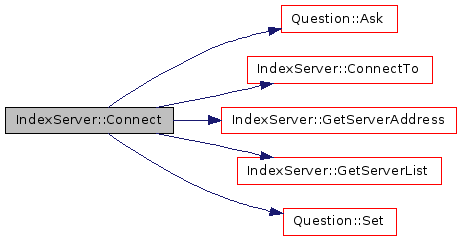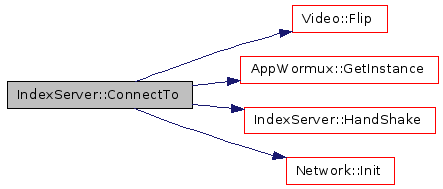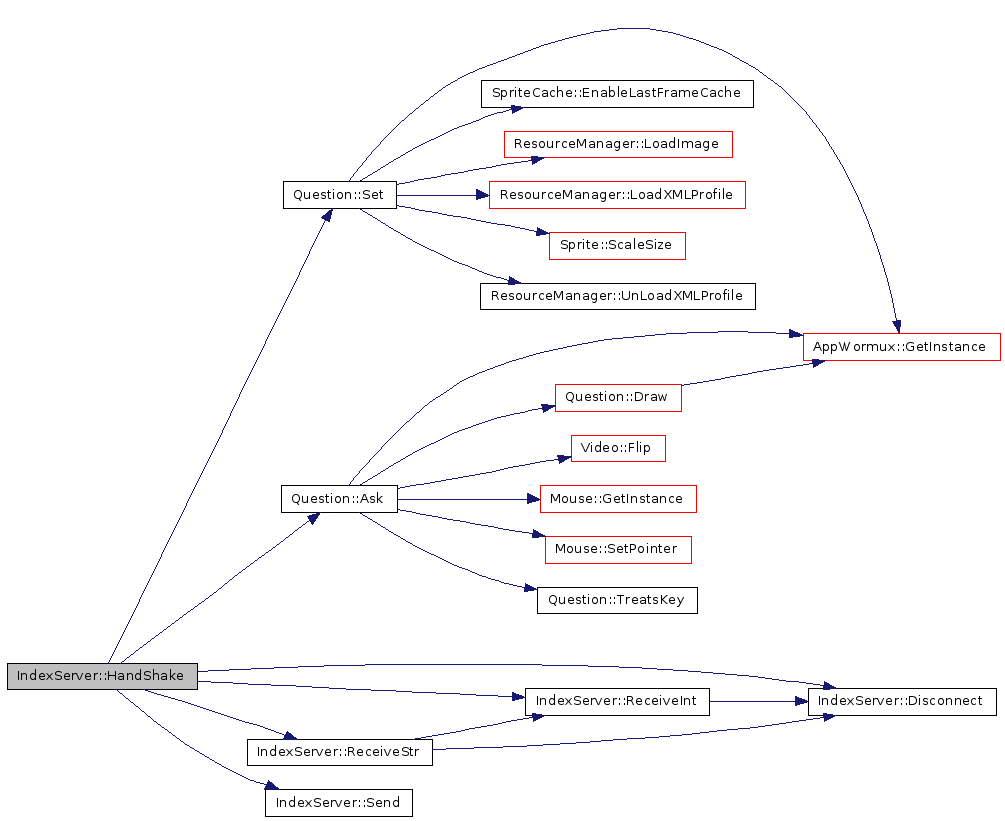| IndexServer::~IndexServer | ( | ) |
Definition at line 47 of file index_server.cpp.
00048 { 00049 server_lst.clear(); 00050 if(connected) 00051 Disconnect(); 00052 }
Here is the call graph for this function:

#include <index_server.h>
Public Member Functions | |
| IndexServer () | |
| ~IndexServer () | |
| bool | Connect () |
| void | SetHiddenServer () |
| void | SendServerStatus () |
| void | Disconnect () |
| std::list< address_pair > | GetHostList () |
Private Member Functions | |
| void | Send (const int &nbr) |
| void | Send (const std::string &str) |
| int | ReceiveInt () |
| std::string | ReceiveStr () |
| bool | GetServerList () |
| bool | GetServerAddress (std::string &address, int &port) |
| bool | ConnectTo (const std::string &address, const int &port) |
| bool | HandShake () |
Private Attributes | |
| TCPsocket | socket |
| IPaddress | ip |
| std::map< std::string, int > | server_lst |
| std::map< std::string, int >::iterator | first_server |
| std::map< std::string, int >::iterator | current_server |
| bool | hidden_server |
| bool | connected |
Definition at line 34 of file index_server.h.
| IndexServer::IndexServer | ( | ) |
Definition at line 38 of file index_server.cpp.
00039 { 00040 hidden_server = false; 00041 connected = false; 00042 server_lst.clear(); 00043 first_server = server_lst.end(); 00044 current_server = server_lst.end(); 00045 }
| IndexServer::~IndexServer | ( | ) |
Definition at line 47 of file index_server.cpp.
00048 { 00049 server_lst.clear(); 00050 if(connected) 00051 Disconnect(); 00052 }
Here is the call graph for this function:

| bool IndexServer::Connect | ( | ) |
Definition at line 55 of file index_server.cpp.
00056 { 00057 MSG_DEBUG("index_server", "Connecting.."); 00058 assert(!connected); 00059 00060 if( hidden_server ) 00061 return true; 00062 00063 if( !GetServerList() ) 00064 return false; 00065 00066 std::string addr; 00067 int port; 00068 00069 // Cycle through the list of server 00070 // Until we find one running 00071 while( GetServerAddress( addr, port) ) 00072 { 00073 if( ConnectTo( addr, port) ) 00074 return true; 00075 } 00076 00077 Question question; 00078 question.Set(_("Unable to contact an index server!"),1,0); 00079 question.Ask(); 00080 00081 return false; 00082 }
Here is the call graph for this function:

Here is the caller graph for this function:

| bool IndexServer::ConnectTo | ( | const std::string & | address, | |
| const int & | port | |||
| ) | [private] |
Definition at line 84 of file index_server.cpp.
00085 { 00086 MSG_DEBUG("index_server", "Connecting to %s %i", address.c_str(), port); 00087 Question question; 00088 question.Set(_("Contacting main server..."),1,0); 00089 question.Draw(); 00090 AppWormux::GetInstance()->video.Flip(); 00091 00092 network.Init(); // To get SDL_net initialized 00093 00094 MSG_DEBUG("index_server", "Opening connection"); 00095 00096 // if( SDLNet_ResolveHost(&ip, "localhost" , port) == -1 ) 00097 if( SDLNet_ResolveHost(&ip, address.c_str() , port) == -1 ) 00098 { 00099 question.Set(_("Invalid index server adress!"),1,0); 00100 question.Ask(); 00101 printf("SDLNet_ResolveHost: %s\n", SDLNet_GetError()); 00102 return false; 00103 } 00104 00105 socket = SDLNet_TCP_Open(&ip); 00106 00107 if(!socket) 00108 { 00109 printf("SDLNet_ResolveHost: %s\n", SDLNet_GetError()); 00110 return false; 00111 } 00112 00113 connected = true; 00114 00115 return HandShake(); 00116 }
Here is the call graph for this function:

Here is the caller graph for this function:

| void IndexServer::Disconnect | ( | ) |
Definition at line 118 of file index_server.cpp.
00119 { 00120 if( hidden_server ) 00121 { 00122 hidden_server = false; 00123 return; 00124 } 00125 00126 if( !connected ) 00127 return; 00128 00129 MSG_DEBUG("index_server", "Closing connection"); 00130 first_server = server_lst.end(); 00131 current_server = server_lst.end(); 00132 00133 SDLNet_TCP_Close(socket); 00134 connected = false; 00135 }
Here is the caller graph for this function:

| std::list< address_pair > IndexServer::GetHostList | ( | ) |
Definition at line 315 of file index_server.cpp.
00316 { 00317 Send(TS_MSG_GET_LIST); 00318 int lst_size = ReceiveInt(); 00319 std::list<address_pair> lst; 00320 while(lst_size--) 00321 { 00322 IPaddress ip; 00323 ip.host = ReceiveInt(); 00324 ip.port = ReceiveInt(); 00325 const char* addr = SDLNet_ResolveIP(&ip); 00326 char port[10]; 00327 sprintf(port, "%d", ip.port); 00328 00329 address_pair addr_pair; 00330 addr_pair.second = std::string(port); 00331 00332 if(addr == NULL) 00333 { 00334 // We can't resolve the hostname, so just show the ip address 00335 unsigned char* str_ip = (unsigned char*)&ip.host; 00336 char formated_ip[16]; 00337 snprintf(formated_ip, 16, "%i.%i.%i.%i", (int)str_ip[0], 00338 (int)str_ip[1], 00339 (int)str_ip[2], 00340 (int)str_ip[3]); 00341 addr_pair.first = std::string(formated_ip); 00342 } 00343 else 00344 addr_pair.first = std::string(addr); 00345 lst.push_back(addr_pair); 00346 } 00347 return lst; 00348 }
Here is the call graph for this function:

Here is the caller graph for this function:

| bool IndexServer::GetServerAddress | ( | std::string & | address, | |
| int & | port | |||
| ) | [private] |
Definition at line 196 of file index_server.cpp.
00197 { 00198 MSG_DEBUG("index_server", "Trying a new server"); 00199 // Cycle through the server list to find the first one 00200 // accepting connection 00201 if( first_server == server_lst.end() ) 00202 { 00203 // First try : 00204 // Randomly select a server in the list 00205 int nbr = randomObj.GetLong( 0, server_lst.size()-1 ); 00206 first_server = server_lst.begin(); 00207 while(nbr--) 00208 ++first_server; 00209 00210 assert(first_server != server_lst.end()); 00211 00212 current_server = first_server; 00213 00214 address = current_server->first; 00215 port = current_server->second; 00216 return true; 00217 } 00218 00219 ++current_server; 00220 if( current_server == server_lst.end() ) 00221 current_server = server_lst.begin(); 00222 00223 address = current_server->first; 00224 port = current_server->second; 00225 00226 return (current_server != first_server); 00227 }
Here is the call graph for this function:

Here is the caller graph for this function:

| bool IndexServer::GetServerList | ( | ) | [private] |
Definition at line 146 of file index_server.cpp.
00147 { 00148 MSG_DEBUG("index_server", "Retrieving server list"); 00149 // If we already have it, no need to redownload it 00150 if(server_lst.size() != 0) 00151 return true; 00152 00153 // Download the list of user 00154 const std::string server_file = Config::GetInstance()->GetPersonalDir() + "server_list"; 00155 00156 if( !downloader.Get(server_list_url.c_str(), server_file.c_str()) ) 00157 return false; 00158 00159 // Parse the file 00160 std::ifstream fin; 00161 fin.open(server_file.c_str(), std::ios::in); 00162 if(!fin) 00163 return false; 00164 00165 /*char * line = NULL; 00166 size_t len = 0;*/ 00167 ssize_t read; 00168 std::string line; 00169 00170 // GNU getline isn't available on *BSD and Win32, so we use a new function, see getline above 00171 while ((read = getline(line, fin)) >= 0) 00172 { 00173 if(line.at(0) == '#' || line.at(0) == '\n' || line.at(0) == '\0') 00174 continue; 00175 00176 std::string::size_type port_pos = line.find(':', 0); 00177 if(port_pos == std::string::npos) 00178 continue; 00179 00180 std::string hostname = line.substr(0, port_pos); 00181 std::string portstr = line.substr(port_pos+1); 00182 int port = atoi(portstr.c_str()); 00183 00184 server_lst[ hostname ] = port; 00185 } 00186 00187 fin.close(); 00188 00189 first_server = server_lst.end(); 00190 current_server = server_lst.end(); 00191 MSG_DEBUG("index_server", "Server list retrieved. %i servers are running", server_lst.size()); 00192 00193 return (server_lst.size() != 0); 00194 }
Here is the call graph for this function:

Here is the caller graph for this function:

| bool IndexServer::HandShake | ( | ) | [private] |
Definition at line 283 of file index_server.cpp.
00284 { 00285 Send(TS_MSG_VERSION); 00286 Send(Constants::VERSION); 00287 00288 int msg = ReceiveInt(); 00289 std::string sign; 00290 00291 if(msg == TS_MSG_VERSION) 00292 sign = ReceiveStr(); 00293 00294 if(msg != TS_MSG_VERSION || sign != "MassMurder!") 00295 { 00296 Question question; 00297 question.Set(_("It doesn't seem to be a valid Wormux server..."),1,0); 00298 question.Ask(); 00299 Disconnect(); 00300 return false; 00301 } 00302 return true; 00303 }
Here is the call graph for this function:

Here is the caller graph for this function:

| int IndexServer::ReceiveInt | ( | ) | [private] |
Definition at line 246 of file index_server.cpp.
00247 { 00248 char packet[4]; 00249 if( SDLNet_TCP_Recv(socket, packet, sizeof(packet)) < 1 ) 00250 { 00251 Disconnect(); 00252 return 0; 00253 } 00254 00255 Uint32 u_nbr = SDLNet_Read32(packet); 00256 int nbr = *((int*)&u_nbr); 00257 return nbr; 00258 }
Here is the call graph for this function:

Here is the caller graph for this function:

| std::string IndexServer::ReceiveStr | ( | ) | [private] |
Definition at line 260 of file index_server.cpp.
00261 { 00262 int size = ReceiveInt(); 00263 00264 if(!connected) 00265 return ""; 00266 00267 assert(size > 0); 00268 char* str = new char[size+1]; 00269 00270 if( SDLNet_TCP_Recv(socket, str, size) < 1 ) 00271 { 00272 Disconnect(); 00273 return ""; 00274 } 00275 00276 str[size] = '\0'; 00277 00278 std::string st(str); 00279 delete []str; 00280 return st; 00281 }
Here is the call graph for this function:

Here is the caller graph for this function:

| void IndexServer::Send | ( | const std::string & | str | ) | [private] |
Definition at line 240 of file index_server.cpp.
00241 { 00242 Send(str.size()); 00243 SDLNet_TCP_Send(socket, (void*)str.c_str(), str.size()); 00244 }
Here is the call graph for this function:

| void IndexServer::Send | ( | const int & | nbr | ) | [private] |
Definition at line 230 of file index_server.cpp.
00231 { 00232 char packet[4]; 00233 // this is not cute, but we don't want an int -> uint conversion here 00234 Uint32 u_nbr = *((Uint32*)&nbr); 00235 00236 SDLNet_Write32(u_nbr, packet); 00237 SDLNet_TCP_Send(socket, packet, sizeof(packet)); 00238 }
Here is the caller graph for this function:

| void IndexServer::SendServerStatus | ( | ) |
Definition at line 305 of file index_server.cpp.
00306 { 00307 assert(network.IsServer()); 00308 00309 if(hidden_server) 00310 return; 00311 Send(TS_MSG_HOSTING); 00312 Send(network.GetPort()); 00313 }
Here is the call graph for this function:

Here is the caller graph for this function:

| void IndexServer::SetHiddenServer | ( | ) | [inline] |
Definition at line 76 of file index_server.h.
00076 { hidden_server = true; };
Here is the caller graph for this function:

bool IndexServer::connected [private] |
Definition at line 50 of file index_server.h.
std::map<std::string, int>::iterator IndexServer::current_server [private] |
Definition at line 45 of file index_server.h.
std::map<std::string, int>::iterator IndexServer::first_server [private] |
Definition at line 43 of file index_server.h.
bool IndexServer::hidden_server [private] |
Definition at line 48 of file index_server.h.
IPaddress IndexServer::ip [private] |
Definition at line 38 of file index_server.h.
std::map<std::string, int> IndexServer::server_lst [private] |
Definition at line 41 of file index_server.h.
TCPsocket IndexServer::socket [private] |
Definition at line 37 of file index_server.h.
 1.4.7
1.4.7